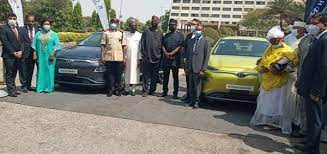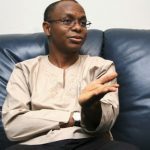Nigeria Unveils Electric Vehicle Pilot Project In Lagos
Latest Headlines, News Across Nigeria, News From The State Tuesday, April 19th, 2022
(AFRICAN EXAMINER) – As part of its efforts geared towards harnessing the inherent benefits of renewable energy, the Federal Government has unveiled its Electrical Vehicle (EV) pilot project.
The project was developed by the Ministry of Power, with the financial support of the European Union (EU), the German Ministry for Economic Cooperation and Development (BMZ), within the framework of the Nigerian Energy Support Programme (NESP).
The feat was achieved at Gbamu-Gbamu, one of the mini-grid sites supported by NESP during its first phase, and has produced insights on the potentials of EVs in rural and peri-urban communities.
Speaking at the unveiling of the Electric Vehicle Opportunities in Rural and Peri-urban Communities ceremony which was held in Lagos, the Acting Director of
Renewable and Rural Power Access Department in the ministry, Mr. Abubakar Dapshima, said the relevance of the EV pilot project at the Gbamu-Gbamu solar mini-grid community cannot be over emphasised.
According to him, the objective of the project is to showcase the opportunities and impact electric mobility synergised with solar mini grid projects bring to communities.
“The project has thus far revealed great benefits that cut across economic and environmental aspects, to both the community dwellers and the mini-grid developers”, he said.
The Executive Director, Rural Electrification Agency, Barka Sajou, said while investors are being encouraged to explore the solar mini-grid sector, one major challenge to the sustainability of the sector is the adoption of mini-grids for productive use activities.
“To resolve this, the Rural Electrification Agency, with support from NESP, continues to support mini-grid developers to scale-up sustainable solutions for the sector”, he added
Similarly, in her remarks at the event, the Head of Section, Green and Digital Economy at the EU delegation to Nigeria and ECOWAS, Ms. Inga Stefanowicz noted that the EU’s support within the framework of NESP aims to create an open market for more investments in the renewable energy market in Nigeria in order to advance access to reliable and affordable electricity in Nigeria, especially in the disadvantaged areas of the country.
She added that the EU is also keen on promoting initiatives aimed at boosting energy demand in the solar mini-grid space including the use of electric vehicles.
Also speaking at the ceremony, the Director-General of the National Automotive Design and Development Council (NADDC), Mr. Jelani Aliyu reaffirmed the agency’s commitment to promoting investment in the automotive sector.
He said EV as not just the future of transportation but a technology already in use which, he noted, has begun a paradigm shift globally and in Nigeria.
“It is therefore, an excellent development that electric motorbikes are already being deployed and tested in rural mini-grid communities, revealing huge potential for the role of electric mobility across Nigeria”, he further explained.
Interestingly, NADDC’s National Automotive Industry Development Plan (NAIDP), currently being implemented, captures the role of EVs in driving Nigeria’s economy.
Recently, the agency enabled and promoted the assembly of the first Electric Vehicle in Nigeria, the Hyundai Kona EV and is now working on strategies to scale and mainstream EVs across Nigeria.
In the first phase of NESP, the programme provided capital in-kind grants to support the development of six solar mini-grids in rural communities providing clean electricity to approximately 16,000 people across five states in the country.
Lending credence to this assertion, NESP’s Head of Programme, Mr. Duke Benjamin said Nigeria has up to 100 operational NESP mini-grid sites which have extra or additional power to give.
Mr. Benjamin who was represented by Mr. Olumide Fatoki, Head of Unit, Sustainable Energy Access at the NESP, also disclosed that the NESP is trying to increase productive usage in these places to increase social activities, economic activities and improve livelihood
Related Posts
Short URL: https://www.africanexaminer.com/?p=75912






















